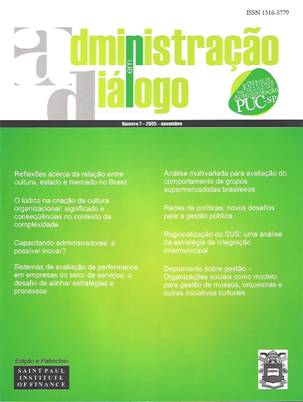O lúdico na criação da cultura organizacional: significado e conseqüências no contexto da complexidade.
DOI:
https://doi.org/10.20946/rad.v7i1.667Abstract
O trabalho enfoca criação da cultura organizacional contrapondo a Teoria do Homo Ludens de Huizinga ao modelo de Total Quality Control – TQC – tomado este último como uma das estratégias de criação de cultura nas organizações. Analisa seus elementos lúdicos como elementos de cultura, caracterizando seus pressupostos e distorções. Desenvolve uma reflexão crítica acerca de suas conseqüências para os indivíduos e para as organizações, possibilitando compreender contradições entre cultura organizacional e a sobrevivência e competitividade da organização no contexto de um mundo globalizado. Palavras-chave: Cultura, lúdico, organização, globalização Abstract The paper focalizes the criation of organizational culture opposing Huizinga’s Homo Ludens Theory to the model of Total Quality Control – TQC – taken this latter as one of the strategies of criation of culture in the organizations. Analyses its ludic elements as elements of culture characterising its presuppositions and distortions. Develops a critical reflection about its consequencies to the individuals and to the organizations making it possible to understand the contradictions between organizational culture and the survival and competitivity of the organizations in the context of a globalized world. Key-words: Culture, playful, organization, globalizedMetrics
Downloads
Published
How to Cite
Issue
Section
License
Authors who publish in this journal agree to the following terms:
1. Authors retain the copyright and grant the journal the right of first publication, with the work licensed simultaneously under a Creative Commons Attribution License after publication, allowing the sharing of work with acknowledgment of the authorship of the work and initial publication in this journal.
2. Authors are authorized to take additional contracts separately, for non-exclusive distribution of the version of the work published in this journal (eg publish in institutional repository or as a book chapter), with acknowledgment of authorship and initial publication in this journal.
3. Authors are allowed and encouraged to publish and distribute their work online (eg in institutional repositories or on their personal page) at any point before or during the editorial process, as this can generate productive changes, as well as increase the and the citation of the published work (See The Effect of Free Access).








